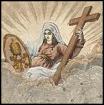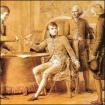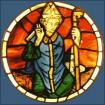%%rimage[Napoleon's concordat and Organic Articles (1801): texts and commentary]=X867_727_FRNapHorseLogo_t55.jpg Napoleon's concordat and Organic Articles (1801): texts and commentary
♦ Napoleon’s concordat: Introduction and summary
♦ Napoleon’s concordat (1801): text
♦ Organic Articles: (1801): text (How Napoleon tamed the concordat)
♦ Imperial catechism (1806): Extract
♦ Napoleon’s concordat lives on and the Kaiser adds another
Napoleon's concordat restored many Church privileges which had been lost during the Revolution, and he called it a “convention” to try to keep it from sounding like a betrayal of the Revolution. However, some of the concessions to the Church granted in the concordat were quietly rescinded by a unilateral addition to it, the “Organic Articles”. Pope Pius VII was furious.












